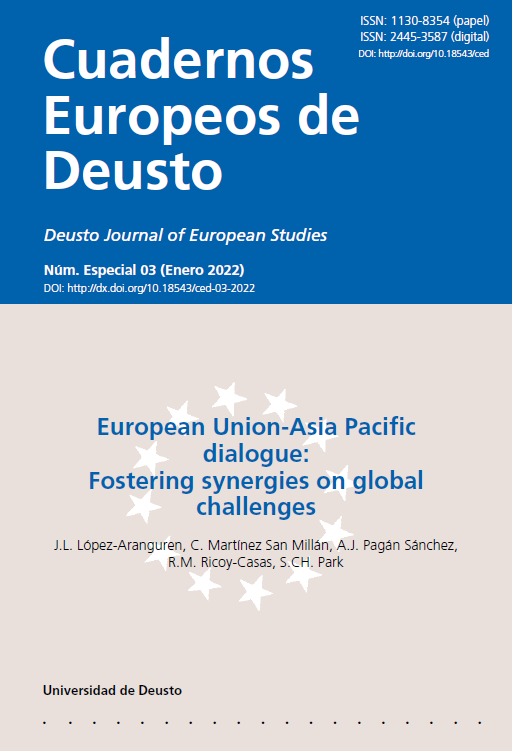Digital currencies: Challenges between the United States, the European Union and Asia Pacific
Abstract
In June 2019, Facebook announced its own cryptocurrency “Libra” to be used through WhatsApp and Messenger, in order for its value to remain stable thanks to the support from banks and electronic commerce companies, linking to different currencies and the support of important companies. EU antitrust regulators investigated it as a “threat to monetary sovereignty”. China is already testing its own DCEP cryptocurrency tied to state banks and major companies, with notable advantages. It will probably displace cash and be used even for world trade, which can make it an alternative to the traditional international payment system, compared to the current one led by the United States with the USD. The Belt and Road Initiative (BRI) offers “the area and the route” to extend the Yen as a global digital currency. These new developments, and their rapid and high competitiveness produced as the “art of bian lian”, have generated intense concerns in the international financial system. Will the EU, Japan or the US be able to counter the virtual yuan so quickly?
Received: 01 September 2021
Accepted: 05 November 2021
Downloads
The author grants to the Publisher the distribution, public communication, and reproduction rights of her/his work subject of publication in Deusto Journal of European Studies (DJES), whichever the media may be, including the permission to include it in the databases where this Journal is indexed and in the institutional repository of the Universidad de Deusto.
Upon its publication, the content of any Issue of Deusto Journal of European Studies (DJES) can be accessed, read, downloaded, copies, and distributed freely for non-commercial purposes and in accordance with any applicable copyright legislation.
The content of Deusto Journal of European Studies (DJES) can be subsequently published in other media or journals, as long as the author clearly indicates in the first footnote that the work was published in Deusto Journal of European Studies (DJES) for the first time, indicating the Issue number, year, pages, and DOI (if applicable). Any other use of its content in any medium or format, now known or developed in the future, requires prior written permission of the copyright holder.
The content of the work published in Deusto Journal of European Studies (DJES) is each author's sole responsibility. The authors assume the responsibility of obtaining all the necessary licenses for the reproduction in their manuscripts of any text, material or illustration coming from another author, institution or publication. The liabilities that may arise from complaints for publishing plagiarised articles are the sole responsibility of the author.


3.jpg)
2.jpg)
2.jpg)
2.jpg)
2.jpg)
2.jpg)







